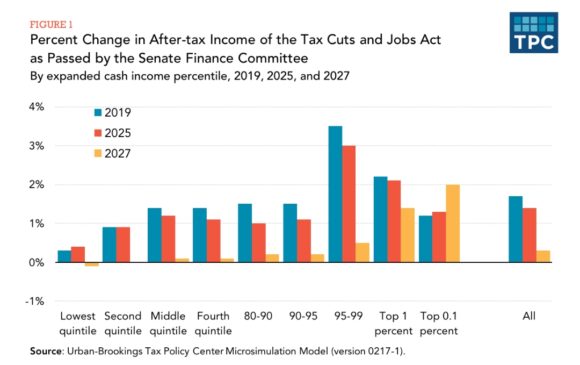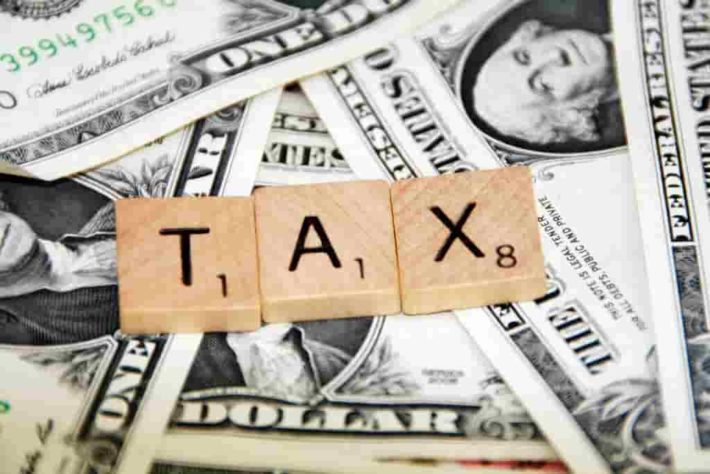Update – Last night’s hasty passage of this bill was a huge mistake. Senators were given just hours to read a 500 page bill. No hearings were held. I can’t imagine how any of them actually read the bill. They should have passed a motion to delay the vote. I surely would have tried….
At the risk of discrediting this article before it even begins I am going to pretend that I am an Independent Senator in the USA considering the current GOP tax plan. If you’re still reading – in my perfect world a sweeping tax plan includes many of the no-brainer policies that I’ve discussed in the past. This would include a full payroll tax cut and an increase in certain types of secondary market “investments” like capital gains and dividends. This would give every working American a tax break as opposed to the current bill which is highly regressive and favors the wealthy. But that’s not happening so let’s move on. Also, we need to accept an important point:
No one should be surprised that a Republican Congress is relying on supply side style tax cuts that will tend to benefit the wealthy and corporations and increase inequality. Yes, the evidence to support this style of tax cut is weak at best, but this is the Congress we have so let’s work with what we have and stop pretending that we might get a more progressive tax plan from a Republican Congress.
One more important thing here to remember. With all this policy debate we sometimes get bogged down in the idea that public policy steers the economy instead of the fact that the economy tends to steer public policy. This tax plan will have an impact on the aggregate economy, but let’s not go thinking this is some sort of world changing policy that will completely change the direction of the economy.
With that out of the way let’s look at why this tax policy is better than some people think:
- This is the biggie that Democrats should actually love – this tax plan is a budget buster. According to the TPC this plan will add $1.4 trillion to the deficit over the next 10 years. Make no mistake – this is good for the economy and it’s a tremendously progressive component of the plan which makes it a bit odd that Republicans like the plan. But here’s the logic. If you read this website enough you know that all the gnashing of teeth about the solvency of the USA and sustainability of the national debt is mostly nonsense (see here for more). The deficit, in a highly productive economy like the USA, adds to the quantity of safe private sector financial assets, enhances household balance sheets with net financial assets, adds to corporate profits and helps act like a safety net of sorts. If you’re a progressive this $1.4 trillion is music to your ears.¹
- Corporate profits will likely rise which should flow through to investment, wages and household wealth. We know that one of the main sources of corporate profits is current dividends and executives have said that they’ll return most of this tax cut to shareholders. This will boost corporate profits which should help bolster investment spending, wages and household wealth. There’s two elements here. Not only will dividends and buybacks likely rise, but so too will the deficit. We know that the deficit and dividends are two important drivers of profits so this plan is likely to be good for profits.
- This bill is an aggregate tax cut. There were many reports in recent weeks that the bill would raise taxes for the average American, but the TPC analysis shows this isn’t right.

Make no mistake. This bill is a bad deal, but sometimes the best deal you’re gonna get is a bad deal. Parts of it, like the removal of student loan deductions and probably Medicare cuts are unnecessarily cruel and illogical. This bill will almost certainly increase inequality and likely won’t boost growth by as much as some Conservatives claim. But we’re getting a tax plan one way or another and this one throws enough bones to Democrats and Independents that I think they can support it without feeling like they won’t get anything out of it.
¹ – As I’ve previously noted, this is not the ideal way to expand the deficit. Real Keynesians would prefer to be peeling the deficit back at this point in a recovery. Then again, after years of failing to expand the deficit sufficiently some Democrats should love what they’re seeing here.
Mr. Roche is the Founder and Chief Investment Officer of Discipline Funds.Discipline Funds is a low fee financial advisory firm with a focus on helping people be more disciplined with their finances.
He is also the author of Pragmatic Capitalism: What Every Investor Needs to Understand About Money and Finance, Understanding the Modern Monetary System and Understanding Modern Portfolio Construction.


